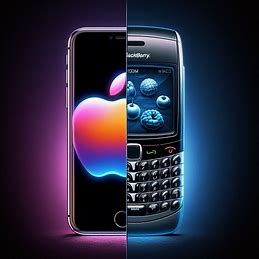At first glance, comparing Apple and BlackBerry may seem like an exercise in contrasting technological eras, but beneath the surface lies a deeper exploration of corporate identity and strategic evolution. To address this question, it’s imperative to delve into the essence of each company’s trajectory, discerning key attributes that contribute to their long-term success or failure risks.

Apple, renowned for its innovative products and disruptive business strategies, embodies a vision of forward-thinking design and user-centric technology. At the core of Apple’s success lies its relentless pursuit of excellence in product development, epitomized by iconic devices like the iPhone and MacBook. This commitment to innovation not only fuels consumer demand but also fosters brand loyalty and market dominance.
Moreover, Apple’s ecosystem approach, characterized by seamless integration across hardware, software, and services, creates a robust and interconnected user experience. This ecosystem lock-in effect cultivates customer retention and provides a competitive edge in an increasingly interconnected digital landscape.
On the other hand, BlackBerry’s narrative unfolds as a cautionary tale of complacency and missed opportunities. Once hailed as a pioneer in mobile communication with its ubiquitous BlackBerry devices, the company faltered in the face of rapidly evolving market dynamics. BlackBerry’s failure to adapt to shifting consumer preferences and embrace touchscreen technology epitomizes a lack of innovation and agility, leading to its decline in relevance and market share.
Furthermore, BlackBerry’s reliance on proprietary infrastructure and closed ecosystem hindered its ability to pivot and capitalize on emerging trends. As competitors embraced open platforms and collaborative ecosystems, BlackBerry found itself isolated and unable to compete effectively in a rapidly evolving market landscape.
In comparing these two companies, some attributes or indicators emerge as critical factors shaping their long-term success or failure risks:
| Apple | BlackBerry | |
| Innovation and Adaptability | ability to innovate and adapt to changing market dynamics | failure to innovate and evolve |
| Ecosystem Integration | interconnected ecosystem fosters customer loyalty and provides a competitive advantage | Lack or closed ecosystem limits its ability to compete effectively |
| Brand Perception and Market Position | strong brand perception and market dominance | diminished brand relevance |
| Strategic Vision and Leadership | visionary leadership and strategic foresight | lack of strategic direction and leadership oversight |
In essence, the comparison between Apple and BlackBerry transcends mere technological prowess, offering profound insights into the principles of innovation, adaptability, and strategic vision that underpin corporate success in a rapidly evolving digital landscape. As we navigate the complexities of the modern business world, the lessons gleaned from these contrasting narratives serve as invaluable guideposts for charting a course towards sustained prosperity and relevance.